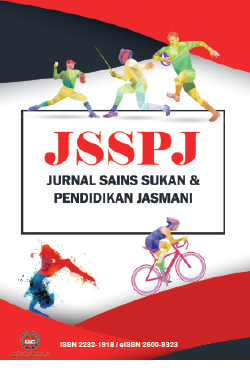The prevalence of nutritional knowledge among soccer athletes within different levels of participant status
DOI:
https://doi.org/10.37134/jsspj.vol10.1.1.2021Keywords:
nutrition, soccer, knowledge, fluid, supplementAbstract
Nutrition knowledge of an athlete, as well as practice, is expected to influence an athlete’s performance. Dietary awareness plays an important role in implementing optimal nutrition practices. The purpose of this study is to assess the prevalence of nutritional knowledge of soccer athletes (n = 95; age 21 ± 1.742; years of involvement 9.72 ± 1.674) within difference level of participation (university vs club). Nutritional knowledge was assessed using a psychometrically validated and reliable questionnaire. Eighty-seven questions were used to assess the knowledge about nutrition which consist of 5 domains which are general nutrition, fluid, recovery, weight control and supplements. The questionnaire was given immediately before and after training. Repeated measure ANOVA revealed a significant difference in nutritional knowledge between university and club level athletes (p = 0.024) with a mean score of 0.461 ± 0.116 vs 0.404 ± 0.125, respectively. The nutrient and fluid domains shown were significantly higher in university with a mean score of 0.516 ± .097 for nutrient and 0.573 ± 0.159 for fluid, respectively. However, no significant difference in other nutritional domains (p < 0.05). The findings of the study provide evidence that they have a significant implication of university involvement concerning their nutritional knowledge.
Downloads
References
Beck, K., Thomson, J. S., Swift, R. J., & von Hurst, P. R. (2015). Role of nutrition in performance enhancement and postexercise recovery. Open Access Journal of Sports Medicine. Doi.org/10.2147/oajsm.s33605
Bedgood, B. L., & Tuck, M. B. (1983). Nutrition knowledge of high school athletic coaches in Texas. Journal of the American Dietetic Association.
Carling, C., & Dupont, G. (2011). Are declines in physical performance associated with a reduction in skill-related performance during professional soccer match-play? Journal of Sports Sciences. Doi.org/10.1080/02640414.2010.521945
Cockburn, E., Fortune, A., Briggs, M., & Rumbold, P. (2014). Nutritional knowledge of UK coaches. Nutrients, 6(4), 1442–1453. https://doi.org/10.3390/nu6041442
Coutts, A. J. (2016). Fatigue in football: it’s not a brainless task! Journal of Sports Sciences, 34(14), 1296–1296. Doi.org/10.1080/02640414.2016.1170475
Cupisti, A., D’Alessandro, C., Castrogiovanni, S., Barale, A., & Morelli, E. (2016). Nutrition knowledge and dietary composition in Italian adolescent female athletes and non-athletes. International Journal of Sport Nutrition and Exercise Metabolism. Doi.org/10.1123/ijsnem.12.2.207
Heikkilä, M., Valve, R., Lehtovirta, M., & Fogelholm, M. (2018). Nutrition knowledge among young finnish endurance athletes and their coaches. International Journal of Sport Nutrition and Exercise Metabolism, 28(5), 522–527. Doi.org/10.1123/ijsnem.2017-0264
Jeukendrup, A. (2014). A step towards personalized sports nutrition: Carbohydrate intake during exercise. Sports Medicine. Doi.org/10.1007/s40279-014-0148-z
Jeukendrup, A. E., & Martin, J. (2001). Improving cycling performance: How should we spend our time and money. Sports Medicine. Doi.org/10.2165/00007256-200131070-00009
Magee, P. J., Gallagher, A. M., & McCormack, J. M. (2017). High prevalence of dehydration and inadequate nutritional knowledge among university and club level athletes. International Journal of Sport Nutrition and Exercise Metabolism. Doi.org/10.1123/ijsnem.2016-0053
Malone, S., Roe, M., Doran, D. A., Gabbett, T. J., & Collins, K. (2017). High chronic training loads and exposure to bouts of maximal velocity running reduce injury risk in elite Gaelic football. Journal of Science and Medicine in Sport, 20(3), 250–254. Doi.org/10.1016/j.jsams.2016.08.005
Manore, M. M., Patton-Lopez, M. M., Meng, Y., & Wong, S. S. (2017). Sport nutrition knowledge, behaviors and beliefs of high school soccer players. Nutrients. Doi.org/10.3390/nu9040350
Nascimento, M., Silva, D., Ribeiro, S., Nunes, M., Almeida, M., & Mendes-Netto, R. (2016). Effect of a nutritional intervention in athlete’s body composition, eating behaviour and nutritional knowledge: A comparison between adults and adolescents. Nutrients, 8(9), 1–14. Doi.org/10.3390/nu8090535
Patton-Lopez, M. M., Manore, M. M., Branscum, A., Meng, Y., & Wong, S. S. (2018). Changes in sport nutrition knowledge, attitudes/beliefs and behaviors following a two-year sport nutrition education and life-skills intervention among high school soccer players. Nutrients, 10(11), 1–22. Doi.org/10.3390/nu10111636
Perron, M., & Endres, J. (1985). Knowledge, attitudes, and dietary practices of female athletes. J Am Diet Assoc.
Rockwell, M. S., Nickols-Richardson, S. M., & Thye, F. W. (2001). Nutrition knowledge, opinions, and practices of coaches and athletic trainers at a Division I University. International Journal of Sport Nutrition. Doi.org/10.1123/ijsnem.11.2.174
Thomas, D. T., Erdman, K. A., & Burke, L. M. (2016). Position of the Academy of Nutrition and Dietetics, Dietitians of Canada, and the American College of Sports Medicine: Nutrition and Athletic Performance. Journal of the Academy of Nutrition and Dietetics, 116(3), 501–528. Doi.org/10.1016/j.jand.2015.12.006
Thomas, M., Nelson, T. F., Harwood, E., & Neumark-Sztainer, D. (2012). Exploring parent perceptions of the food environment in youth sport. Journal of Nutrition Education and Behavior, 44(4), 365–371. Doi.org/10.1016/j.jneb.2011.11.005
Walsh, M., Cartwright, L., Corish, C., Sugrue, S., & Wood-Martin, R. (2011). The body composition, nutritional knowledge, attitudes, behaviors, and future education needs of senior schoolboy rugby players in Ireland. International Journal of Sport Nutrition and Exercise Metabolism.
Wardle, J., Parmenter, K., & Waller, J. (2000). Nutrition knowledge and food intake. Appetite. Doi.org/10.1006/appe.1999.0311
Zinn, Caryn, Schofield, G., & Wall, C. (2006). Evaluation of sports nutrition knowledge of New Zealand premier club rugby coaches. International Journal of Sport Nutrition and Exercise Metabolism. Doi.org/10.1123/ijsnem.16.2.214





